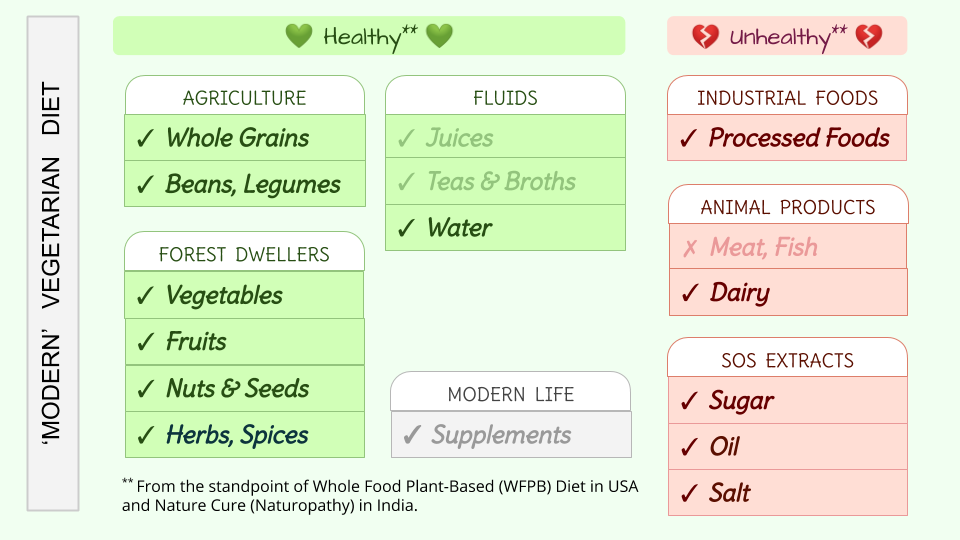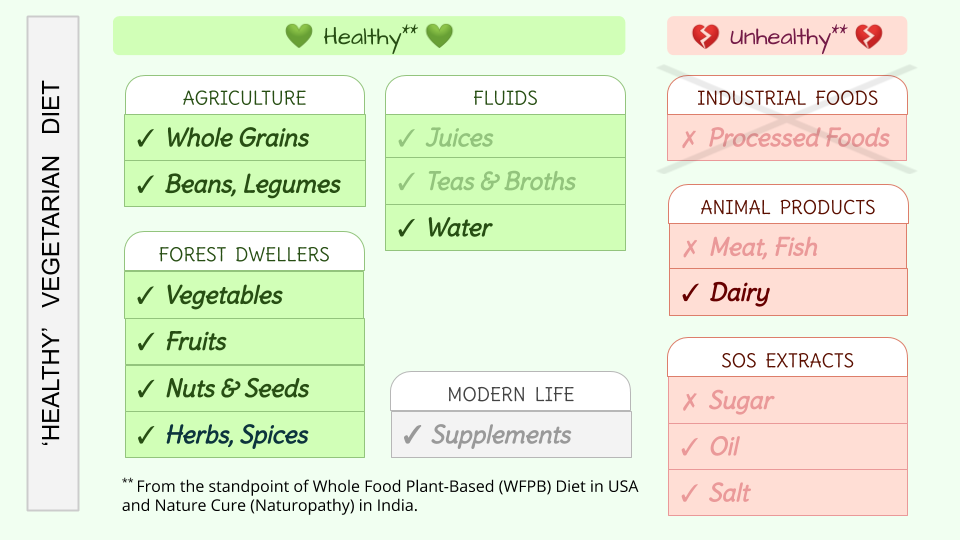A Vegetarian Diet precludes food sources that entail killing of animals (and birds and fish). So Meat and Fish are not consumed. However, Dairy products (and sometimes, eggs) are consumed because animals like cows, buffaloes and goats were traditionally not killed after they stopped producing milk or eggs.
Nowadays, we have two versions of a Vegetarian Diet:
- 'Modern' Vegetarian Diet refers to the food system practiced by the majority of those who call themselves Vegetarians. Processed Foods and all 3 SOS Extracts (Sugar, Oil, Sugar) are commonly consumed.
- 'Healthy' Vegetarian Diet refers to the food system practiced by somebody who has greatly reduced or eliminated Processed Foods and all 3 SOS Extracts (Salt, Oil, Sugar). Often, this is done in response to onset of diseases (for cure, not prevention).
Vegetarians may be sub-divided into categories like Ovo-Vegetarians (eggs, no dairy), Lacto-Vegetarians (milk, no eggs) and Ovo-Lacto-Vegetarians (eggs, dairy). From the perspective of both WFPB and Nature Cure (Naturopathy), these variations are minor because both eggs and dairy are 'animal products'.
From the standpoint of both Whole Food Plant-Based Diet (WFPB) in the West and Nature Cure (Naturopathy) in India, a 'Modern' Vegetarian Diet has many healthy components (the green checkmarks) and five unhealthy components (the red checkmarks). Some people consider the unhealthy components so severely unhealthy that they use the phrase Five White Poisons for 5 foods belonging to these components: white flours, white rice, milk, table salt, and white sugar.
Onset of disease motivates those following a 'Modern' Vegetarian Diet to make dietary changes. Only a rare soul removes all Processed Foods and all 3 SOS Extracts (Salt, Oil, Sugar) completely. Often, only Processed Foods and Sugar are removed completely (by Sugar is meant 'Refined Sugar', not sugar found in fruits); Oil and Salt are reduced. Dairy is rarely perceived as unhealthy or harmful to health; it is almost never eliminated or reduced.
For a broader dicussion, see Low Fat and No Oils!
By eliminating Processed Foods and Sugars, and by reducing Oil and Salt intake, we get a 'Healthy' Vegetarian Diet.
The salient features of a 'Healthy' Vegetarian Diet are:
- Processed Foods: Usually eliminated. At least, they are greatly reduced.
- Dairy products: Included in 'Healthy' Vegetarian Diet, sometimes in copious quantities. Dairy products include milk, butter, buttermilk, 'ghee', 'paneer', 'khoya', condensed milk, and so on.
- Salt: Often reduced. Rarely eliminated.
- Oils: Included. They are rarely eliminated completely. Oil-related guidelines that are often adopted: (a) Use cold-pressed oils instead of industrial oils, (b) Use oils with high smoke points, and (c) Avoid frying and re-heating in oil.
- Sugar: Often eliminated. At least, Sugar is greatly reduced. Sugar refers to refined sugars, not sugars in fruits.
A 'Healthy' Vegetarian Diet has two components whose elimination is advocated by WFPB doctors and Nature Cure (Naturopathy) guidelines. These components are Dairy and Oil.
By eliminating both Dairy and Oil, a 'Healthy' Vegetarian Diet transforms into WFPB Diet or Nature Cure (Naturopathy) Diet. If Salt is also eliminated, we get WFPB-SOS Diet.
About 30% to 40% of Indian population is vegetarian. Interestingly, Indian states in the north-west have the maximum number of vegetarians:
Excerpt from Wikipedia article on Vegetarianism:According to a 2014 survey released by the registrar general of India, Rajasthan has the highest fraction of vegetarians: 74.9%. Other states with vegetarians include Haryana (69.25%), Punjab (66.75%), Gujarat (60.95%), Madhya Pradesh (50.6%), Uttar Pradesh (47.1%), Maharashtra (40.2%), Delhi (39.5%), Jammu & Kashmir (31.45%), Uttarakhand (27.35%), Karnataka (21.1%), Assam (20.6%), Chhattisgarh (17.95%), Bihar (7.55%), Jharkhand (3.25%), Kerala (3.0%), Orissa (2.65%), Tamil Nadu (2.35%), Andhra Pradesh (1.75%), West Bengal (1.4%), and Telangana (1.3%).
Let's try to visualize the above numbers. The highest number of vegetarians are found in the North-West states of India — around 65% to 75% of people follow Vegetarian Diet (either the 'Modern' Vegetarian Diet or the 'Healthy' Vegetarian Diet — both are defined below). Now imagine drawing two curved arrows, both starting at the North-West states. One curved arrow goes towards Central states of India, continuing to Eastern states of India. The second arrow goes towards Central states of India, continuing to Southern states of India. As we traverse along these two arrows, vegetarianism progressively drops, culminating in percentages as low as 1% to 5%.
I encourage my friends to follow Whole Food Plant-Based (WFPB) Diet which excludes all animal products. Even dairy and eggs are excluded. Turns out that milk and milk products like butter, and 'ghee' (clarified butter) are so revered and so deeply embedded in Indian sub-continent cultures that even considering that these food sources could possibly be harmful is unthinkable!
When I discuss milk and dairy with my friends, in addition to sharing scientific evidence that has led to the development of Whole Food Plant-Based (WFPB) Diet in USA, I also make an emotional appeal to them. Basically, Vegetarianism is based on the principle of non-killing which is part of a larger concept called 'non-violence'. Considering how milk is produced in the world today — both in large-sized, corporation-owned factory farms and in small-sized, family-owned diary farms — is it okay to call ourselves 'non-violent' when we also participate in milk and milk products consumption? Some food for thought:

 Instagram
Instagram YouTube
YouTube
